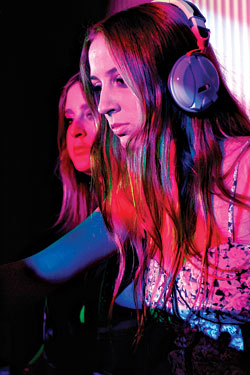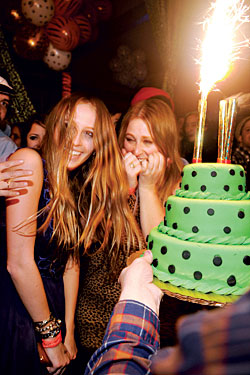
Cassie Coane and Harley Viera-Newton, 22-year-old D.J. besties of the moment, are sick, sick, sick. Over a two-hour lunch at La Esquina, the duo—who’ve become the package-deal unit of party-soundtrack cool, 2010 edition—deploy the word about two dozen times to describe: vintage-print dresses; Cassie’s black 1997 Jeep Cherokee she just drove cross-country from L.A.; the Tints, Harley’s Cardigans-esque all-girl high-school band; what people in clubs say when they play early-eighties post-punk sets (“but they don’t really dance,” admits Cassie); melodies that inevitably are a part of a good “rager” (their preferred term for a track that gets people dancing); getting a $100 tip to go against their principles and play a Bon Jovi song; the American South, which Cassie says she’s obsessed with; their lives when they found themselves D.J.-ing a party at the club Le Baron in Paris during Fashion Week in March and invited some cute Canadian skater boys they knew over from Barcelona to hang with them.
“We were like, ‘Our life is sick,’ ” says Cassie.
“Every time something like that happens, we look at each other and high-five each other,” says Harley, who shows up for lunch in a floral spaghetti-strap sundress and Ralph Lauren lace-ups—all vintage—drinks iced coffee, and doesn’t order food.
Cassie arrives in a nautical-stripe minidress and white Keds, stubbing out a cigarette and ordering a michelada. She asks for a salad.
The fashion world always needs its twentysomething D.J.’s to spin up-to-date music at its many, many events. To provide the appropriate soundscape to envelope the whole endeavor in the urgent self-assurance of Right Now. There was the exotic Justine D(elaney), whose “Motherfucker” party set the electroclash tone of the early aughts. (She became a pastry chef.) Then came Andrew Andrew, two gay guys who dressed up as nerd twins and played music off their iPods. Fashion D.J. mania may have reached its apogee a few years ago with the Misshapes—that death-stare trio of Leigh Lezark, Geordon Nicol, and Greg Krelenstein—whose weekly party of the same name and shared look of black-lacquered hair slashed against vampirishly white faces became so iconic it ended up on the runway for Hedi Slimane’s Dior Homme.
Now come Harley and Cassie, who were both born on February 17, 1988, and grew up in L.A. They project a more wholesome, sunny, sweet “California Gurls” milk-and-honey image. Wearing adorable, colorful minidresses while they spin the Cramps, they’re more about prosperity then perversity. They are neither, nor do they cater to the dirty-boho-Bushwick set. As a matter of fact, Harley and Cassie, who both live in Soho (but not in the same apartment) and strike a vintage-clothes balance in their style that is unmistakably unimpoverished, hardly seem to know anybody who lives in Brooklyn at all. And they’ve become the party D.J.’s that the great recession needed.
Harley’s British record-exec father, Ashley Newton, signed the Spice Girls and Massive Attack, among other pop stars, and became president of Columbia Records earlier this year. Her mother, Cristina Viera-Newton, is a Brazilian model turned co-founder of the fashionista-approved Tom Binns jewelry line (which Harley, a good daughter, talks up consistently in interviews). Harley, who sometimes models, got her mother’s exotic looks and kept a hint of her father’s accent (she also plays bass). At lunch, she’s carrying a brand-new, massive Dior bag (complete with a Miu Miu kitty cat she’s attached)—she’s the official D.J. and social ambassador for Dior’s makeup line. Her teddy-bear cute, 26-year-old boyfriend, James Cruickshank, owns a T-shirt company and is a partner in the new East Village burger joint Whitmans.
Cassie, whose full figure, breathless pronouncements, and party-ready social energy evoke a millennial Mama Cass, is the daughter of what she describes as “hippies.” Her father is Jim Coane, the TV producer behind the PBS preschool series Dragon Tales, and her mother, Amy Coane, runs the store at the Santa Monica Museum of Art. Cassie is currently single. As for her last boyfriend, she says, “I don’t even want to give him the honor of talking about him.”
Harley attended Harvard-Westlake (the Dalton of L.A.), while Cassie and her friends went to the more bohemian Crossroads. They met when they were both freshmen: “One of Cassie’s friends was wearing the same Japanese Super Lovers sweater and I was like, ‘They’re so cool, they get me,’ ” Harley says.
“They dressed very cool” says Harley. “This is about 2003.”
“It was, like, ages ago!” exclaims Cassie.
Harley says she didn’t fit in at Harvard-Westlake wearing her mother’s Comme des Garçons dresses while the other girls wore T-shirts or Juicy Couture. She transferred to Crossroads junior year.
After graduation, they moved to New York. Harley went to NYU, where she studied Egyptology, and Cassie to the New School, where she majored in cultural studies after ditching an impulse to be a journalist. Both just graduated, and the torpid job market isn’t really troubling them. “We’re like, ‘Our jobs are too fun, this isn’t real life,’ ” says Harley.

“Hanging out with them is like a focus group for me,” says Chrissie Miller, 33, whose Sophomore-clothing-line party the girls D.J.-ed in Paris. “ ‘Okay, what are the kids into?’ They’re the next generation, the kids about town, the popular kids.” They’re also part of a young L.A.-to-Manhattan crowd that includes the rock-chick socialite Cory Kennedy, the photographer Jack Siegel, Brady Fujikawa, and D.J. Austin Peters and that mixed with the Olsen twins, Julia Restoin Roitfeld, and Agyness Deyn at the West Village’s now-shuttered Beatrice Inn.
They’re also hustlers. “It’s cheesy to say, but there’s something for everyone when we play,” Harley says, explaining their sonic services. “Hip-hop, eighties.”
“You’re either buying a drink or you’re dancing, depending on what we’re playing,” Cassie adds, with the slightly reckless enthusiasm the on-point and aloof Harley rarely gives off. The girls’ D.J. style is eclectic—a testament to Harley’s music-executive father as well as their having come of age when an entire archive of pop isn’t hidden away in dusty boxes of LP’s but just a download away. They D.J. on a program called Serato Scratch Live, which transfers songs from MP3s to an actual piece of vinyl.
Tops on their rager playlist: Depeche Mode’s “Just Can’t Get Enough,” Bowie’s “Modern Love,” Billy Idol’s “Dancing With Myself,” the Jam’s “Town Called Malice,” “You’re the One That I Want” from Grease, the Cardigans’ “Lovefool,” the Smiths’ “Ask.” Right now they’re really into Rick Ross’s “Blowin’ Money Fast.”
Harley and Cassie’s rise to haute sickness began the summer after Harley’s freshman year at NYU. She and a male friend also named Harley (Wertheimer) started throwing a party at Gallery Bar on the Lower East Side. “There was such a crazy influx of kids from L.A. into New York not knowing where to go,” says Harley (not Wertheimer), “so the fact that we threw the first New York party for L.A. kids made it a huge success. We made tons of money and it was really insane.”
That party got Harley D.J.-ing, which led to a gig at the Beatrice. When that ended, in mid-2008, the girls got Leo Fitzpatrick (who was in the 1995 lost-youth movie Kids but has lately been a D.J.) to introduce them to Erik Foss, the artist-skaterboy proprietor of the East Village club Lit, whom they’d been e-mailing asking if they could spin there. Lit is a grotty assemblage of dark stucco, brick, scummy band-sticker decoupage, and a spooky skeleton with Christmas lights sitting atop the bar. Foss gave them Wednesday nights.
Foss says the girls “helped us turn the whole bar around. All of a sudden, we had everyone from Lindsay Lohan to the Olsen twins coming in”—and not just on Wednesdays. “It’s all young art kids they brought in, California kids whose parents could afford to send them to NYU. There were lots of credit cards, but they were the sweetest, most no-trouble crowd.” Foss says that “they have such an insane following they could be total fucking princesses if they wanted and take the party anywhere.” Most D.J.’s get about 10 percent of a bar’s take. Harley and Cassie get a little more. (He, like the girls, wouldn’t say what they actually make.) “They wear ripped jeans and flannel shirts and dress like the hot grunge girls I went to high school with in Phoenix,” he says. “Even if they grew up affluent, they don’t want anyone to know about it. I grew up without money, and they’ve proven to me there’s good people everywhere.”
Lit’s success helped get them jobs at the Jane Hotel and Avenue, as well as parties like the U.S. launch of the French fashion line Comptoir des Cotonniers, a presentation for the designer Carlos Campos, and last spring’s gala for the Museum of Natural History (“in between two mammal displays!” remembers Cassie).
Last February, they had their 22nd co-birthday at Marquee, the cavernous, aggressively climate-controlled bottle-service club so affluently banal that it doesn’t even get mentioned in “Page Six” much anymore. Harley counts it among “places we used to lawff”—here she sounds English again—“at and think were cheesy.” But Andrew Goldberg, a promoter for Marquee and the similarly slick Avenue, where the girls now D.J. on Tuesdays, said “‘We’ll throw you a crazy birthday party,’” says Harley. “So we were like, ‘You know what? Fuck it, let’s throw a crazy rager at a superclub. Why not?’ Our friends were like, ‘We’re not going to go to Marquee.’ ”
“Yeah, people hated us for it!” Cassie erupts.
“But it blew people’s minds,” says Harley, “because it was all bottles of Champagne, sparklers going off.” Wow, I say. All free? “Yeah. It was amazing.”

Goldberg, who could easily fit into the testosterone-fueled, hair-gelled Entourage ensemble, says it was a good investment. “They’re D.J.’s as well as promoters. That to me is a lethal weapon in a high-end hipster nightclub,” he tells me at Avenue, while Harley and Cassie play “Please Mr. Postman” and the Strokes’ “Someday.” Harley wears a red-and-white polka-dot dress she said she got for $12 and ten-year-old flats. Cassie wears a denim dress from Opening Ceremony—“denim is my favorite color besides the American flag,” she says—and vintage loafers.
The crowd at Avenue is tanned and Grey Goose–sipping, apparently still living some Sex and the City fugue, the girls in spike heels and the boys with their dress shirts untucked. Goldberg knows Harley and Cassie bring some hipness to the room.
“The mainstream wants to be a part of their world,” he says, “so we set up a room where we have the hipsters at one table and a bottle-service customer at the next.”
He lets their L.A. friends drink there for free. “We’d rather have the cool people here than in any other bar,” he said, “so we can surround them with the people that can spend money.”
I go sit on Avenue’s quieter back stairs and have a drink with Paul Sevigny, the former Beatrice proprietor and one of the night’s promoters. He just turned 39 and is natty in a dark-blue gingham suit and John Lobb custom shoes. “They’re wonderful girls, and they’re gonna go a long way,” he says in a dutiful-sounding singsong. “Fifteen years ago, their parents never would have let them move to the city.” Thanks to an acquaintance who also was a partner in Beatrice, Harley started spinning there with another scenester, Rachel Chandler. Later Cassie joined them. But that didn’t last. There was a disagreement, and, as Sevigny understands it, “one of them burned the other with a cigarette.” Whatever happened, Harley and Cassie left and teamed up at Lit. (Harley says she had no idea what Sevigny was talking about, but that she, Cassie, and Rachel were all great friends.)
Harley and Cassie seem to make Sevigny nostalgic for what he remembers as a grittier time in New York, when D.J.’s were artists or professional freaks who played records as part of some sort of aesthetic mission. “They’re not talking about their art, their dancing, their writing,” he says of the girls. “Maybe they’re the forefront of the next New York.” And that makes him feel … ? “Like I’m going to sit home with my Ramones records and cry? I dunno. If you love New York, you have to embrace the fact that it’s always changing.”
I’d asked Harley and Cassie where they see this all going. “I have to think about that more,” says Harley, ever judicious.
“I want to keep hanging out with Harley,” Cassie says. “To keep doing this until someone, like, tells us to stop.” She frowns at me. “That’s, like, asking the most insane question. When you just graduated from college, you don’t know!”
Still, sometimes, she says, “I literally close my eyes and see a downward spiral.” I look at Harley, who doesn’t react. “But maybe not?”